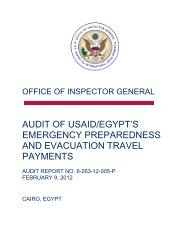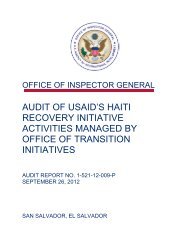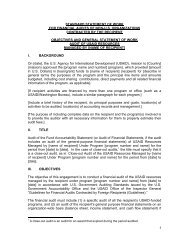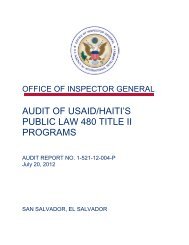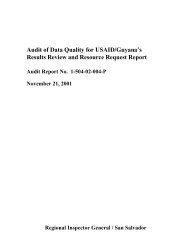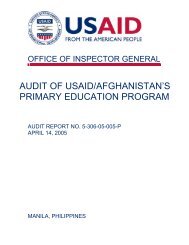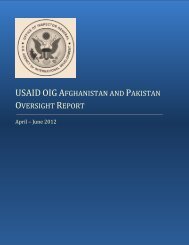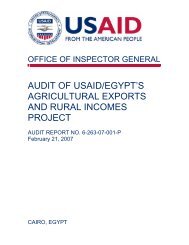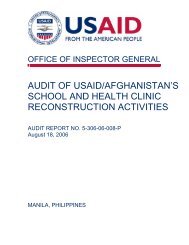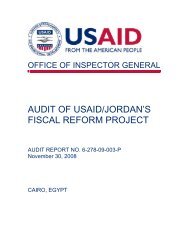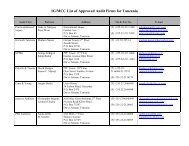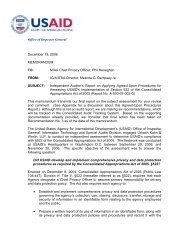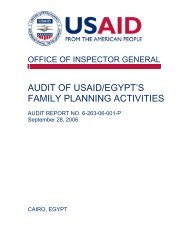Audit of Selected Payments By USAID/Egypt For Evacuation Travel ...
Audit of Selected Payments By USAID/Egypt For Evacuation Travel ...
Audit of Selected Payments By USAID/Egypt For Evacuation Travel ...
Create successful ePaper yourself
Turn your PDF publications into a flip-book with our unique Google optimized e-Paper software.
OFFICE OF INSPECTOR GENERALAUDIT OF SELECTEDPAYMENTS BY <strong>USAID</strong>/EGYPTFOR EVACUATION TRAVEL ANDRELATED ALLOWANCESAUDIT REPORT NO. 6-263-12-001-PDECEMBER 13, 2011CAIRO, EGYPT
Office <strong>of</strong> Inspector GeneralDecember 13, 2011MEMORANDUMTO:FROM:SUBJECT:<strong>USAID</strong>/<strong>Egypt</strong> Mission Director, Walter NorthRegional Inspector General/Cairo, Jacqueline Bell /s/<strong>Audit</strong> <strong>of</strong> <strong>Selected</strong> <strong>Payments</strong> by <strong>USAID</strong>/<strong>Egypt</strong> for <strong>Evacuation</strong> <strong>Travel</strong> and RelatedAllowances (Report No. 6-263-12-001-P)This memorandum transmits our report on the subject audit. In finalizing the report, we carefullyconsidered your comments on the draft report and have included them in Appendix II.The report includes ten recommendations to <strong>USAID</strong>/<strong>Egypt</strong>. In response to the draft report,<strong>USAID</strong>/<strong>Egypt</strong> mission <strong>of</strong>ficials agreed with four recommendations, partially agreed with tworecommendations, and disagreed with the remaining four recommendations. Consequently,management decisions have been reached and final action taken on Recommendations 6 and7. In addition, management decisions will be reached on Recommendations 1 and 8 when adetermination has been made on the amount <strong>of</strong> questioned costs to be recovered.Management decisions have not been reached on parts <strong>of</strong> Recommendations 3 and 9 or onRecommendations 1, 2, 4, 5, 8, and 10.The mission should determine the amount <strong>of</strong> questioned cost to be recovered forRecommendations 1 and 8 by the target date, and provide action plans and target dates toimplement recommendations 2, 3, 4, 5, 9 and 10 within 30 days <strong>of</strong> the final report.Thank you for the cooperation and courtesy extended to the audit team during this audit.U.S. Agency for International Development<strong>USAID</strong> Office Building1a Nady El-Etisalat Street,<strong>of</strong>f El-Laselki StreetNew MaadiCairo, <strong>Egypt</strong>www.usaid.gov/oig
CONTENTS Summary <strong>of</strong> Results ................................................................................................................... 1 <strong>Audit</strong> Findings.............................................................................................................................4 <strong>USAID</strong>/<strong>Egypt</strong> Did Not Accurately Pay Some Subsistence Expense Allowances.............................................................................................................................. 4 <strong>USAID</strong>/<strong>Egypt</strong> Did Not Require Use <strong>of</strong> Government Card After Providing an Advance ........... 5 <strong>USAID</strong>/<strong>Egypt</strong> Did Not Liquidate an Advance before Paying Additional Claims ...................... 7 <strong>USAID</strong>/<strong>Egypt</strong> Did Not Accurately Reimburse Employees for <strong>Evacuation</strong> Allowances ............ 8 <strong>USAID</strong>/<strong>Egypt</strong> Did Not Appropriately Approve <strong>Evacuation</strong> Allowance Reimbursements ......... 9 <strong>USAID</strong>/<strong>Egypt</strong> Did Not Ensure That Reimbursements Were Reconciled With Approved <strong>Travel</strong> Documentation........................................................................................... 11 <strong>USAID</strong>/<strong>Egypt</strong> Did Not Require Employees to Submit <strong>Travel</strong> Authorizations With Reimbursement Requests ..................................................................................................... 13 Evaluation <strong>of</strong> Management Comments................................................................................... 15 Appendix I—Scope and Methodology .................................................................................... 17 Appendix II—Management Comments ................................................................................... 19 Appendix III—Some Allowances Available for Evacuated Employees................................ 24 The following abbreviations appear in this report:ACO authorized certifying <strong>of</strong>ficerADS Automated Directives SystemDoS Department <strong>of</strong> StateDSSR Department <strong>of</strong> State Standardized RegulationFY fiscal yearGAO Government Accountability OfficeGMRA Government Management Reform ActM&IE meals and incidental expensesOFM Office <strong>of</strong> Financial ManagementRIG/Cairo Regional Inspector General/CairoSEA subsistence expense allowanceTA travel authorizationTSMA transitional separate maintenance allowanceVSMA voluntary separate maintenance allowance
evacuations from <strong>Egypt</strong>, the mission had an increased risk <strong>of</strong> inaccurate payment <strong>of</strong> allowancesto evacuees as authorized in DSSR 630.The Regional Inspector General/Cairo (RIG/Cairo) added this audit 2 to its fiscal year (FY) 2011audit plan after identifying anomalies with some reimbursement requests based on<strong>USAID</strong>/<strong>Egypt</strong>’s FY 2011 Government Management Reform Act (GMRA) audit. The GMRArequires <strong>USAID</strong> to submit audited financial statements to the Office <strong>of</strong> Management and Budgetannually. As one <strong>of</strong> the 46 <strong>USAID</strong> accounting stations, <strong>USAID</strong>/<strong>Egypt</strong> manages about$2.8 billion in financial obligations and provides financial services to ten client missions. As part<strong>of</strong> <strong>USAID</strong>’s FY 2011 financial statement audit led by the Financial <strong>Audit</strong>s Division <strong>of</strong> <strong>USAID</strong>’sOffice <strong>of</strong> Inspector General, RIG/Cairo conducted an audit <strong>of</strong> some <strong>of</strong> the mission’s financialstatement line items and financial management procedures. Part <strong>of</strong> the GMRA audit wasdesigned to determine whether requests for travel reimbursement were appropriate from areview <strong>of</strong> a sample <strong>of</strong> 30 transactions valued at $386,485. 3 RIG/Cairo will issue the results <strong>of</strong>an expanded audit on <strong>USAID</strong>/<strong>Egypt</strong>’s emergency preparedness and the extent to whichallowance payments that the mission provided to evacuated employees were appropriate andallowable.Under strict time constraints and with insecure conditions to relocate 115 U.S. direct-hireemployees and their dependents, <strong>USAID</strong>/<strong>Egypt</strong> prepared travel authorizations to expeditedeparture from <strong>Egypt</strong>. Although the mission performed quick-response evacuation actionscommendably, <strong>USAID</strong>/<strong>Egypt</strong> did not pay some allowances and evacuation travel benefitsaccurately and appropriately in the audit’s limited sample. That is, the mission reimbursedsome employees for expenses not covered under travel payments or other allowances, resultingin questioned costs valued at $5,112.Specifically, the audit found the following concerns: <strong>USAID</strong>/<strong>Egypt</strong> did not accurately pay some subsistence allowances (page 4). <strong>USAID</strong>/<strong>Egypt</strong> did not require use <strong>of</strong> government cards after providing advance (page 5). <strong>USAID</strong>/<strong>Egypt</strong> did not liquidate an advance before paying additional claims (page 7). <strong>USAID</strong>/<strong>Egypt</strong> did not accurately reimburse employees for evacuation allowances (page 8). <strong>USAID</strong>/<strong>Egypt</strong> did not appropriately approve evacuation allowance reimbursements (page 9).<strong>USAID</strong>/<strong>Egypt</strong> did not ensure that reimbursements were reconciled with approved traveldocumentation (page 11).<strong>USAID</strong>/<strong>Egypt</strong> did not require employees to submit travel authorizations with reimbursementrequests (page 13).2This is the first <strong>of</strong> two audit reports on the results <strong>of</strong> <strong>USAID</strong>/<strong>Egypt</strong>’s efforts to pay evacuation benefits.Results from RIG/Cairo’s audit testing during the GMRA were not included as separate findings in theOffice <strong>of</strong> Inspector General’s “<strong>Audit</strong> <strong>of</strong> <strong>USAID</strong>'s Financial Statements for FYs 2011 and 2010” (ReportNo. 0-000-12-001-C).3 This sample was drawn from a total <strong>of</strong> 223 transactions valued at $1.2 million submitted to<strong>USAID</strong>/<strong>Egypt</strong>’s Office <strong>of</strong> Financial Management as <strong>of</strong> June 30, 2011. Typically, employees submitted onevoucher each per month during the 3-month evacuation period.2
To address these findings with allowances paid during the evacuation period, the audit identifiedissues that may help the mission strengthen its management controls to (1) accurately recordtransactions and events in a timely manner, and (2) properly execute transactions and events.This audit recommends that <strong>USAID</strong>/<strong>Egypt</strong>:1. Determine the allowability <strong>of</strong> $2,601 in questioned costs and recover from the employee anyamounts determined to be unallowable (page 5).2. Update and implement its procedures to include verifying reimbursement requests todetermine whether separate maintenance allowance benefits were properly authorized andallowable and collecting any costs determined to be unallowable (page 5).3. Issue a written reminder to all employees to adhere to Agency guidelines that require theuse <strong>of</strong> the government travel card in lieu <strong>of</strong> an advance <strong>of</strong> funds and publicize the possiblepenalties for not following the guidelines (page 7).4. Determine the type <strong>of</strong> <strong>of</strong>fense, administer the appropriate penalty, and document theappropriate mission or personnel file accordingly (page 7).5. Document the limitations for advances to U.S. direct-hire staff in the mission’s proceduresfor advances and accounts payable (page 7).6. Determine the allowability <strong>of</strong> $1,000 in questioned costs and recover from the employee anyamounts determined to be unallowable (page 8).7. Determine the allowability <strong>of</strong> $389 in questioned costs and recover from the employee anyamounts determined to be unallowable (page 9).8. Review employees’ payment requests for lodging to determine the allowability <strong>of</strong> allpayments including the identified questioned costs <strong>of</strong> $657, $240, and $225 and recoverfrom the employees any amounts determined to be unallowable (page 11).9. Develop and implement management review procedures that supervisors can verify anddocument on an intermittent schedule (page 12).10. Revise and implement its mission procedures to require financial management staff toinclude travel authorizations in a travel voucher package before employee reimbursementsare processed (page 14).Appendix I contains information on the scope and methodology. Detailed findings are includedin the sections that follow. Management comments are included in their entirety in Appendix II,and our evaluation <strong>of</strong> management comments is included in the report on page 15.3
AUDIT FINDINGS <strong>USAID</strong>/<strong>Egypt</strong> Did Not AccuratelyPay Some Subsistence ExpenseAllowancesThe U.S. Government has several regulations and guidance governing payments duringevacuations or authorized departures and payments <strong>of</strong> separate maintenance allowances. DoSCable 040818, Return <strong>of</strong> Evacuees to Post, Section 2, states that returning evacuees mayreceive subsistence expense allowance (SEA) payments for a specified period to prepare toreturn to post, not to exceed 10 days from the termination date <strong>of</strong> the evacuation—in this case,10 days beyond April 29, or May 9. Additionally, Section 3 <strong>of</strong> the cable requires employees withdependents who do not wish to return to post for the remainder <strong>of</strong> the employee’s tour to beauthorized a voluntary separate maintenance allowance (VSMA), which is documented inDSSR 260, “Separate Maintenance Allowance.” Moreover, DSSR 262, “CircumstancesWarranting SMA [Separate Maintenance Allowance],” allows employees to choose either VSMAor transitional separate maintenance allowance (TSMA). Under VSMA, an employee requestsbenefits for special needs or hardship prior to or after arrival at post for reasons including health,educational, or family considerations for dependents. Under TSMA, an employee requestsbenefits to assist with additional costs incurred when dependents are required to occupycommercial housing temporarily while establishing permanent housing following an evacuation.Contrary to the above guidance, <strong>USAID</strong>/<strong>Egypt</strong>’s OFM overpaid one employee $2,601, as shownin Table 1. The overpayment stemmed from incorrect determinations <strong>of</strong> the type <strong>of</strong> allowanceappropriate at different periods following the lifting <strong>of</strong> the evacuation order.Table 1. Questioned Cost Calculations forSubsistence Expense and Other Allowances(audited)DateAmount ($)TSMA SEA VSMA Collectible5/3–9 1,001 1,368 3675/24–6/25 3,861 1,627 2,234Total 2,601After the DoS lifted the evacuation order on April 29, 2011, the employee appropriatelysubmitted a request for TSMA on May 3, 2011. In accordance with the regulations, an agencymay authorize TSMA when dependents who intend to return to post are in temporarycommercial housing and choose to remain for the completion <strong>of</strong> the current school year if a childis in the final semester <strong>of</strong> the school year when the evacuation is terminated.<strong>For</strong> May 3–9, 2011, <strong>USAID</strong>/<strong>Egypt</strong>’s OFM continued paying the employee SEA benefits <strong>of</strong>$1,368 for meals and incidental expenses (M&IE) for a family <strong>of</strong> five. Although SEA benefitshad not technically expired, paying them for the specified days was incorrect because theemployee had applied for TSMA on May 3, 2011.4
On May 23, 2011, the employee informed <strong>USAID</strong>/<strong>Egypt</strong>’s Mission Director and Executive Officerthat the employee’s family would not return to post. Accordingly, the family should have beenplaced on VSMA as <strong>of</strong> May 24, 2011. Regulations allow the employee to receive TSMA fromMay 3 to May 23, 2011, and then convert to VSMA for May 24–June 25, 2011. 4Although the employee submitted an e-mail to <strong>USAID</strong>/<strong>Egypt</strong>’s Executive Office stating that theemployee “really did not have a justification” for the SEA benefits extension, the ExecutiveOffice approved the 7-day extension <strong>of</strong> benefits, resulting in excess payments. The amountallowable for TSMA for May 3–9, 2011, was $1,001. However, OFM paid the employee $1,368,an excess <strong>of</strong> $367. <strong>For</strong> May 24–June 25, 2011, OFM paid the employee TSMA benefits instead<strong>of</strong> VSMA benefits, resulting in an excess <strong>of</strong> $2,234.Despite informing mission <strong>of</strong>ficials <strong>of</strong> changes in family plans that dictated which types <strong>of</strong>benefits were appropriate, the employee who received the overpayments did not return them.The employee blamed a lack <strong>of</strong> awareness about when the TSMA benefits had begun or thatdependents would convert from TSMA to VSMA following the date <strong>of</strong> intent not to return to post.To address these concerns, this audit makes the following recommendations.Recommendation 1. We recommend that <strong>USAID</strong>/<strong>Egypt</strong> determine the allowability <strong>of</strong>$2,601 in questioned costs and recover from the employee any amounts determined tobe unallowable.Recommendation 2. We recommend that <strong>USAID</strong>/<strong>Egypt</strong> update and implement itsprocedures to include verifying reimbursement requests to determine whether separatemaintenance allowance benefits were properly authorized and allowable and collectingany costs determined to be unallowable.<strong>USAID</strong>/<strong>Egypt</strong> Did Not Require theUse <strong>of</strong> Government CardsAfter Providing an AdvancePublic Law 105-264, “<strong>Travel</strong> and Transportation Reform Act <strong>of</strong> 1998,” requires federalemployees to use federal travel charge cards for all payments <strong>of</strong> expenses <strong>of</strong> <strong>of</strong>ficialgovernment travel. In accordance with the law, <strong>USAID</strong> drafted Automated Directives System(ADS) 522.5.17, “<strong>Travel</strong> Advances for <strong>USAID</strong>,” requiring all <strong>USAID</strong> personnel traveling two ormore times per year to use the Agency’s government travel card (the card). Furthermore,applications for travel advances are approved only for travel to locations where the card is notaccepted and cash is required. In cases where cash advances are allowed for U.S. direct hiresfor payment <strong>of</strong> government expenses, DSSR 617, “Amount <strong>of</strong> Advance Payment,” states thatthe amount <strong>of</strong> such payment shall be based on the compensation rate, including any allowancesor post differential to which an employee was entitled immediately prior to the issuance <strong>of</strong> theevacuation order, not to exceed 30 days. Furthermore, “Table <strong>of</strong> Offenses and Penalties,Additional Help for ADS 487 [“Disciplinary and Adverse Actions Based Upon EmployeeMisconduct-Civil Service”],” dated November 6, 2009, lists some commonly identified <strong>of</strong>fensesand outlines the administration <strong>of</strong> penalties for an employee who violates any administrative4According to the employee, the child’s school year ended on June 22, 2011. DSSR 266.4(6),“Transitional SMA,” states that TSMA shall terminate 3 days after the last day <strong>of</strong> school—in this case,June 25, 2011.5
egulation. The table also includes a section on miscellaneous <strong>of</strong>fenses to cover violation <strong>of</strong>any administrative regulations that do not provide for a penalty. Moreover, the table includesminor and major <strong>of</strong>fenses with penalties ranging from oral warnings to removal.<strong>USAID</strong>/<strong>Egypt</strong> approved an advance <strong>of</strong> $10,326 for one employee with the expectation that theemployee would use the advance to pay for lodging expenses that appeared on the statementfor the government travel card. Yet the employee used a personal credit card for lodgingexpenses instead <strong>of</strong> the Agency’s government travel card and used the advance, which themission had made through an electronic transfer into the employee’s personal account, to payfor lodging expenses.<strong>USAID</strong>/<strong>Egypt</strong> <strong>of</strong>ficials stated that OFM typically does not provide U.S. direct-hire employeeswith travel advances for temporary duty travel. <strong>USAID</strong> policy is to use the government travelcard whenever possible because, as noted in a previous Office <strong>of</strong> Inspector General report, 5<strong>USAID</strong> receives a higher rebate from the Citibank government travel card based on the volume<strong>of</strong> money spent using the government card. In addition, the fewer days taken to pay thebalance owed, the higher <strong>USAID</strong>’s rebate-earning potential.However, the former Regional Controller and current Executive Officer decided to allowevacuees to request an advance equal to or above the amount <strong>of</strong> prepaid lodging to ease thefinancial burden associated with the unexpected and disruptive evacuation. The <strong>of</strong>ficialscommunicated this decision in a February 9, 2011, e-mail to evacuated employees.<strong>USAID</strong>/<strong>Egypt</strong>’s Executive Officer <strong>of</strong>fered various reasons for the advance to the employee. TheExecutive Officer stated that in the evacuation the employee had left the <strong>of</strong>ficial governmentcredit card in <strong>Egypt</strong>. Moreover, the Executive Officer stated that the employee and dependentstraveled to a safe haven where they used commercial lodging requiring payment <strong>of</strong> 1 month inadvance. According to the Executive Officer, housing, meals, and incidental expenses couldcost up to $10,000 in 1 month. In most cases, however, evacuated employees and dependentsarrived at safe haven locations in the United States within a 24-hour period. Moreover, althoughthe employee may have left the government card in <strong>Egypt</strong>, the employee had the option <strong>of</strong>contacting the Financial Policy and Support Division in <strong>USAID</strong>’s Office <strong>of</strong> the Chief FinancialOfficer for a replacement card. According to division staff, a replacement card can be deliveredto an employee in the United States within 3 days.<strong>USAID</strong>/<strong>Egypt</strong>’s Executive Officer stated that the advance was also necessary because creditcard cycles and processing times for reimbursement requests could have delayedreimbursement for evacuation expenses for up to 6 weeks after the credit payment was due.Yet the employee chose to use a personal charge card to pay for evacuation allowanceexpenses instead <strong>of</strong> the funds that <strong>USAID</strong>/<strong>Egypt</strong> had provided as a cash advance into apersonal account.Since <strong>USAID</strong> does not provide loans to its employees for any reason, it is imperative that<strong>USAID</strong> managers ensure that employees follow the rules regarding the mandatory use <strong>of</strong> thegovernment card so that the Agency receives the maximum allowable rebate. When therequirement is not strictly enforced, <strong>USAID</strong> loses valuable rebates from the vendor and alsocreates an atmosphere <strong>of</strong> selective application <strong>of</strong> the regulations. Moreover, since <strong>USAID</strong>regulations do not specifically require any administrative or punitive actions against anemployee who does not use the required government card, nonuse <strong>of</strong> this card will more than5 “ Review <strong>of</strong> <strong>USAID</strong>’s <strong>Travel</strong> Card Program,” Report No. 9-000-10-002-S, August 12, 2010.6
likely continue. Randomly applying the rules subjects management and employees tounnecessary risks <strong>of</strong> abuse and misuse. To address these concerns, this audit makes thefollowing recommendations.Recommendation 3. We recommend that <strong>USAID</strong>/<strong>Egypt</strong> issue a written reminder to allemployees to adhere to Agency guidelines that require the use <strong>of</strong> the government travelcard in lieu <strong>of</strong> an advance <strong>of</strong> funds and publicize the possible penalties for not followingthe guidelines.Recommendation 4. We recommend that <strong>USAID</strong>/<strong>Egypt</strong> determine the type <strong>of</strong> <strong>of</strong>fense,administer the appropriate penalty, and document the appropriate mission or personnelfile accordingly.Recommendation 5. We recommend that <strong>USAID</strong>/<strong>Egypt</strong> document the limitations foradvances to U.S. direct-hire staff in the mission’s procedures for advances and accountspayable.<strong>USAID</strong>/<strong>Egypt</strong> Did NotLiquidate an Advance BeforePaying Additional ClaimsADS 633.3.2, “<strong>Travel</strong> Advance,” states that travelers must not receive travel advances exceptunder special circumstances, which are approved on a case-by-case basis. ADS 633.3.2(b),“<strong>Travel</strong> Advance – Overseas,” requires a controller or a locally designated authority to approvepayment <strong>of</strong> a <strong>USAID</strong>-funded travel advance. In addition, the regulation requires missions todevelop their own procedures for travel advances. Moreover, ADS 625.3.4.5, “EmployeeClaims,” states that <strong>USAID</strong> claims that arise out <strong>of</strong> overpayment <strong>of</strong> salary or benefits, travelallowances, and other overpayments are recoverable by <strong>USAID</strong> through direct billing or salary<strong>of</strong>fset. During the <strong>USAID</strong>/<strong>Egypt</strong> evacuation, DoS Cable 008759, “Authorized VoluntaryDeparture from Cairo,” effective January 30, 2011, authorized an advance <strong>of</strong> $1,000 per family.At the mission, the OFM has been proactive in developing procedures for documenting andreviewing accounts payable and advances. Based on the mission’s procedures, financialmanagement staff is required to produce a report on the aging <strong>of</strong> advances and follow up withemployees to ensure that liquidations occur at least quarterly. If an employee does not liquidatean advance in a timely manner, the mission controller is responsible for making a collection by<strong>of</strong>fset from a travel voucher disbursement or from an employee’s salary.Although the DoS evacuation cable authorized an advance <strong>of</strong> $1,000 per family, the OFM didnot deduct the value <strong>of</strong> an advance from one employee’s travel claims. A voucher examinerapproved and paid a claim <strong>of</strong> $15,832 to one employee although the employee documented thecash advance on a travel reimbursement request. Consequently, the mission overpaid theemployee the amount <strong>of</strong> the advance, or $1,000.Mission OFM <strong>of</strong>ficials believe that the overpayment occurred because <strong>of</strong> a voucher examiner’soversight. The advance remained outstanding for 7 months, until auditors conducted tests <strong>of</strong>data during a review <strong>of</strong> the mission’s consolidated financial statements.Although the evacuation period was a stressful time for many, OFM <strong>of</strong>ficials should exercisedue pr<strong>of</strong>essional care when paying expenses and reimbursing employees for travel claims to7
avoid overpayments. In doing so, the mission ensures that limited financial resources are usedfor their intended purposes in accordance with federal regulations. Accordingly, this auditmakes the following recommendation.Recommendation 6. We recommend that <strong>USAID</strong>/<strong>Egypt</strong> determine the allowability <strong>of</strong>$1,000 in questioned costs and recover from the employee any amounts determined tobe unallowable.<strong>USAID</strong>/<strong>Egypt</strong> Did NotAccurately Reimburse Employees for<strong>Evacuation</strong> AllowancesThe DSSR 600 Series, “<strong>Payments</strong> During <strong>Evacuation</strong>/Authorized Departure,” Section 631,“<strong>Travel</strong> Expense Allowances,” requires travel per diem for the employee and dependents to bepayable from the date <strong>of</strong> departure from an evacuated post through the date <strong>of</strong> arrival at a safehaven, including any periods <strong>of</strong> delay en route beyond the evacuee’s control that may resultfrom travel arrangements. DoS <strong>Evacuation</strong> Cable 008759 designates the safe haven for allDoS employees as Washington, D.C., and for other agencies as the location <strong>of</strong> theirheadquarters. DSSR 631a, “Special Safehaven <strong>Travel</strong> Considerations,” states that evacuatedemployee dependents have the option <strong>of</strong> traveling to and residing in any place in the UnitedStates, even though the employee’s safe haven is authorized as Washington, D.C. TheSecretary <strong>of</strong> State makes the <strong>of</strong>ficial decisions about an alternate safe haven that is in a foreignarea. In addition, the regulation entitles employees to other benefits, such as subsistenceexpenses and telephone calls pertaining to the evacuation, but does not authorize excessbaggage expenses.According to the DoS, the approved per diem rates for Istanbul, Turkey, were $252 for lodgingand $115 for M&IE for February 2011. However, <strong>USAID</strong>/<strong>Egypt</strong> paid excess benefits <strong>of</strong> $389 toone employee whose spouse was evacuated from Cairo to Istanbul on January 31, 2011. Thespouse remained in Istanbul for 5 nights before arriving at the safe haven location inWashington, D.C., on February 6, 2011. The employee requested reimbursement for hotel,meals and incidentals, and excess baggage for 5 nights in Istanbul, resulting in anoverpayment, as shown in Table 2.Table 2. Questioned Cost Calculations for Multiple Expenses (audited)($)Employee Payment Request <strong>Audit</strong> Calculation CollectibleDate Lodging M&IE Total Lodging M&IE Total Variance1/31/2011 240 95 335 191 86 277 58 2/1/2011 240 127 367 191 115 306 61 2/2/2011 240 127 367 191 115 306 61 2/3/2011 240 127 367 191 115 306 61 2/4/2011 240 127 367 191 115 306 61 Baggage 87 87Total 1,890 1,501 389Based on a review <strong>of</strong> supporting invoices, the lodging rate for the 5 nights in Istanbul was 303Turkish lira per night. According to Oanda Corporation’s Trading and Exchange Rate Services, 8
the exchange rate as <strong>of</strong> February 4, 2011, was equivalent to $191. In addition, the employeeclaimed 5 nights for M&IE at $127 when the actual rate was $115. Moreover, the employeerequested reimbursement <strong>of</strong> $240, or about $50 per night more than authorized, and claimed$87 for excess baggage that was an unauthorized expense.<strong>USAID</strong>/<strong>Egypt</strong>’s Executive Officer approved the additional days en route to the <strong>of</strong>ficial safe havenso that the couple could be reunited at an alternate safe haven in a foreign area where theemployee was on temporary duty. As a justification, the Executive Officer stated that themarginal cost <strong>of</strong> paying for additional expenses while waiting for a DoS Under Secretarydecision was warranted. According to the voucher examiner’s supervisor, the voucher examinerand supervisor did not identify the overpayment because the OFM staff was under pressurecaused by the <strong>Egypt</strong>ian revolution.Although the Executive Officer had limited authority to approve an extended layover in someinstances, financial management staff must exercise due pr<strong>of</strong>essional care to ensure thatfunding is accurate and not in excess <strong>of</strong> immediate needs to avoid overpayments. To addressthis issue, this audit makes the following recommendation.Recommendation 7. We recommend that <strong>USAID</strong>/<strong>Egypt</strong> determine the allowability <strong>of</strong>$389 in questioned costs and recover from the employee any amounts determined to beunallowable.<strong>USAID</strong>/<strong>Egypt</strong> Did NotAppropriately Approve<strong>Evacuation</strong> Allowance ReimbursementsThe authorized rate schedule for Washington, D.C., lists the lodging rate as $181 per night forFebruary 2011. DSSR 632, “Subsistence Expense Allowance (SEA),” authorizes benefits forevacuated employees and dependents that include lodging, with receipt, and M&IE. Financialmanagement staff may authorize lodging up to 100 percent <strong>of</strong> the per diem rate for a family orup to 150 percent for special family compositions. Accordingly, the allowable lodging at a safehaven may include the per diem plus a flat amount equal to 100 percent <strong>of</strong> the M&IE portion <strong>of</strong>the safe haven per diem rate. The regulations define special family compositions as:(a) First Evacuee plus one (nonspouse or nondomestic partner family member, age 18 orolder).(b) First Evacuee plus one (nonspouse/nondomestic partner family member <strong>of</strong> opposite gender,age 12 or older).(c) First Evacuee plus two (one nonspouse/nondomestic partner family member, age 18 orolder; or one nonspouse/nondomestic partner family member, opposite gender, age 12 orolder).(d) First Evacuee plus three (one nonspouse/nondomestic partner family member, age 12 orolder).(e) First Evacuee plus four or more family members.9
The mission processed one <strong>of</strong> two requests for reimbursement <strong>of</strong> evacuation expenses for anemployee who claimed a per diem lodging rate that did not match lodging receipts provided.The overpayment, valued at about $657, occurred when the employee changed the lodging ratethat OFM paid from previously approved reimbursement requests. Consequently, the employeeclaimed the maximum allowable lodging rate instead <strong>of</strong> actual lodging expenses charged in aprior reimbursement submission. Although the allowable lodging rate in Washington, D.C.,during February 2011 was $181 per night, the employee claimed various daily rates for theperiod <strong>of</strong> February 5–22, 2011, resulting in $4,251 in total costs <strong>of</strong> $657 more than the allowableamount, as shown in Table 3.Table 3. Questioned Cost Calculations for Subsistence Expenses (audited)($)ExpenseEmployeeVoucher<strong>Audit</strong>CorrectionVarianceCollectibleLodging : 2/5–22/2011 3,732 3,172 560Taxes 519 422 97Total 4,251 3,594 657<strong>USAID</strong>/<strong>Egypt</strong> financial management staff approved the reimbursement request based ondocumentation submitted by the employee that showed a total daily value for 84 days at the rate<strong>of</strong> $211 a night that was based on the maximum allowable daily lodging rates. According to theemployee and the authorized certifying <strong>of</strong>ficer, the former controller approved the retroactivecalculation <strong>of</strong> the reimbursement amount because the employee provided a revised receiptcalculated with a daily rate <strong>of</strong> $211 per night that was below the maximum reimbursable amountfor the period <strong>of</strong> February 5–22, 2011. Nevertheless, the employee is entitled only to actualdaily lodging costs and not the maximum allowable daily lodging rate.The audit also disclosed that <strong>USAID</strong>/<strong>Egypt</strong> processed at least one request for reimbursement <strong>of</strong>evacuation allowance for a Senior <strong>For</strong>eign Service <strong>of</strong>ficer who claimed a per diem lodging ratein excess <strong>of</strong> the allowable amount. The overpayment, valued at about $240 for the employeeand spouse, occurred when the employee claimed and was paid an unallowable lodging rate.Although the allowable lodging rate in Washington, D.C., during February 2011 was $181 pernight, the employee claimed $191 per night for 20 <strong>of</strong> 25 lodging nights, as illustrated in Table 4.Table 4. Questioned Cost Calculations for Subsistence Expenses (audited)($)Expense Employee <strong>Audit</strong> VarianceVoucher Correction CollectibleLodging Rate 191 181 10Taxes 28 26 2Subtotal 219 207 12# <strong>of</strong> nights x 20 x 20 x 20Total 4,380 4,140 240According to <strong>of</strong>ficials, <strong>USAID</strong>/<strong>Egypt</strong> approved the excess lodging payments because the Senior<strong>For</strong>eign Service <strong>of</strong>ficer and spouse qualified as a special family composition, as there werealways two people staying in the room. However, according to the definition in DSSR 632, an10
employee and spouse do not qualify as a special family composition. Consequently, theemployee paid about $240 more than the allowable SEA benefit.In addition, the mission processed a request for reimbursement <strong>of</strong> evacuation allowance foranother employee who claimed a per diem lodging rate in excess <strong>of</strong> the allowable amount. Theoverpayment, valued at about $222, happened when the employee claimed and was paid anincorrect lodging rate for February 2011. Although the allowable lodging rate in Washington,D.C., during February 2011 was $181 per night, the employee claimed $209 per night for9 nights, as shown in Table 5.Table 5. Questioned Cost Calculations for Subsistence Expenses (audited)($)ExpenseLodging RateTaxesSubtotal# <strong>of</strong> nightsTotalEmployeeVoucher20923232x 92,088<strong>Audit</strong>Correction18126207x 91,863VarianceCollectible28(3)25x 9225According to the mission’s supervising voucher examiner, OFM staff was under pressurecaused by the revolution in <strong>Egypt</strong>. Consequently, the voucher examiner and supervisor did notaccurately review the traveller’s request for reimbursement.<strong>USAID</strong> financial management staff authorizes payments <strong>of</strong> government funds to ensure thatincurred debts are paid in a timely manner. However, a mission should make every effort toensure that receipt documentation supports a request for reimbursements that are authorized,allocable, allowable, and correct to avoid payments in excess <strong>of</strong> allowable expenses. Using thebest documentation available can help staff avoid overpayments. In cases where authorizedallowable rates may fluctuate, mission financial management staff should remain alert torequests for payments <strong>of</strong> a total line item cost that may be better calculated based on a dailyrate that could fluctuate in excess <strong>of</strong> allowable expenses. As a result, this audit makes thefollowing recommendation.Recommendation 8. We recommend that <strong>USAID</strong>/<strong>Egypt</strong> review employees’ paymentrequests for lodging to determine the allowability <strong>of</strong> all payments including the identifiedquestioned costs <strong>of</strong> $657, $240, and $225 and recover from the employees any amountsdetermined to be unallowable.<strong>USAID</strong>/<strong>Egypt</strong> Did NotEnsure That ReimbursementsWere Reconciled WithApproved <strong>Travel</strong> DocumentationADS 596.3.1, “Establishing Internal Controls,” states that internal control activities help ensurethat management directives are carried out, and the control activities must be effective andefficient in accomplishing the Agency’s control objectives. ADS 596.3.1c further notes thatcontrol activities include reviews by management at the functional or activity level, and11
appropriate documentation <strong>of</strong> transactions and internal control. The responsibilities <strong>of</strong> anauthorized certifying <strong>of</strong>ficer (ACO), documented in ADS 630.2f, “Primary Responsibility forCertifying Officers,” include ensuring that the law permits the payment; that the authorizedpaying <strong>of</strong>fice has obtained the required administrative approvals; and that the prices andcalculations are accurate.At <strong>USAID</strong>/<strong>Egypt</strong>, mission financial management <strong>of</strong>ficials developed procedures for documentingand reviewing accounts payable and advances in 2006. In accordance with the missionprocedures, the ACO is required to verify that voucher information in the accounting systemagrees with the hard copy <strong>of</strong> the travel voucher. If the information on the hard copy <strong>of</strong> thevoucher agrees with the information in the accounting system, the ACO certifies and approvesthe voucher for payment in the accounting system. If the ACO does not approve the voucher,the hard copy <strong>of</strong> the voucher is returned to the supervisory voucher examiner, who hasmanagement oversight responsibilities to ensure that the voucher examiner makes thenecessary corrections to the payment document. When the voucher examiner revises thepayment document and the supervisor approves the revisions, the voucher examiner returns thehard copy to the ACO for certification and approval.A review <strong>of</strong> six <strong>of</strong> <strong>USAID</strong>/<strong>Egypt</strong>’s approved allowance reimbursement requests (vouchers)showed that the payment amount did not always match the amount on the approved allowancevoucher. Of the six sampled allowance vouchers, only three had amounts that matched thepayment recorded in the accounting system. In one case, the ACO approved a reimbursementrequest for one employee valued at $10,461. However, the mission actually paid the employee$10,489, based on the voucher examiner’s recalculation and a review <strong>of</strong> the accounting system.Although mission payment procedures require the ACO to compare a hard copy <strong>of</strong> the voucherwith the accounting system prior to certification, mission staff noted that the ACO does not relyon the voucher to calculate payments. Instead, the ACO uses the amounts recorded on thevoucher examiner’s recalculation spreadsheet to certify/approve payments in the accountingsystem. Some employees are not following mission procedures, which has resulted in someerrors.As a steward <strong>of</strong> government funds, an ACO has the fiduciary responsibility to ensure that<strong>USAID</strong> payments are legal, authorized, and accurate. An ACO is strictly liable for any illegal,improper, or incorrect payment, and therefore is required to make restitution for any illegal,improper, or incorrect payments resulting from false, inaccurate, or misleading certifications. Itis imperative that a mission’s internal controls operate effectively to provide reasonableassurance that payments are appropriate and accurate to prevent misappropriation or misuse.Consequently, the audit makes the following recommendation.Recommendation 9. We recommend that <strong>USAID</strong>/<strong>Egypt</strong> develop and implementmanagement review procedures that supervisors can verify and document on anintermittent schedule.12
<strong>USAID</strong>/<strong>Egypt</strong> Did Not RequireEmployees to Submit <strong>Travel</strong>Authorizations With ReimbursementRequests<strong>USAID</strong> guidance regarding travel authorizations lies in two ADS chapters. ADS 522.5.2, “<strong>Travel</strong>Authorizations,” notes that the <strong>For</strong>m AID 5–8 is the form for reporting expenses incurred whileperforming <strong>of</strong>ficial travel, and each travel authorization (TA) must document details such as thepurpose <strong>of</strong> travel, authorized point(s) <strong>of</strong> departure and final destination, and expenses eachtraveler is authorized to incur. The TA must also specify whether the government will payrelated expenses directly or will reimburse an employee for expenses incurred.ADS 630.3.10.2, “Voucher Examiner Responsibilities,” states that voucher examiners areresponsible for the proper review and processing <strong>of</strong> vouchers that contractors submit to <strong>USAID</strong>.The review must include the following actions:1. Determining that a valid obligation exists.2. Determining the appropriate <strong>USAID</strong> approvals and authorizations and the supportdocumentation for the obligating document.3. Verifying a payee’s name, address, and other personally identifiable information.4. Checking the mathematical accuracy <strong>of</strong> a vendor’s invoice.5. Observing established internal controls designed to prevent any improper or duplicatepayment.6. Making certain that the disbursement is in accordance with laws and regulations.7. Determining the payment due date and computing interest on late payments, if required, inaccordance with prompt payment guidelines.Since 2004, <strong>USAID</strong>/<strong>Egypt</strong> has used a computerized filing system to store some <strong>of</strong> its financialdata. Although <strong>USAID</strong>/<strong>Egypt</strong>’s policy is to upload vouchers and supporting documentation,some <strong>of</strong> the supporting documentation was not uploaded for 9 <strong>of</strong> 30 sampled allowancevouchers valued at $119,941. Mission <strong>of</strong>ficials noted that supporting TAs would be available forreview in an original hard copy document. However, files for eight <strong>of</strong> nine vouchers, valued at$107,491, did not contain the authorizing documents to support a reimbursement request orliquidation.Although the Agency requires that TAs be submitted with each voucher, mission <strong>of</strong>ficials notedthat the TAs were not included in the voucher files because the authorizations were obtainedduring a prior voucher submission, and the voucher examiner did not require employees toresubmit the authorizing document, the AID 5–8 travel authorization.The minimum documentation required to establish and verify <strong>of</strong>ficial travel as valid is a properlyapproved travel authorization. Voucher examiners are not able to validate obligations withoutapproved travel authorizations. Accordingly, this audit makes the following recommendation.13
Recommendation 10. We recommend that <strong>USAID</strong>/<strong>Egypt</strong> revise and implement itsmission procedures to require financial management staff to include travel authorizationsin a travel voucher package before employee reimbursements are processed.14
EVALUATION OF MANAGEMENTCOMMENTSOf the ten recommendations in our draft report, <strong>USAID</strong>/<strong>Egypt</strong> <strong>of</strong>ficials agreed with fourrecommendations, partially agreed with two recommendations, and disagreed with theremaining four recommendations. Consequently, management decisions have been reachedand final action taken on Recommendations 6 and 7. Management decisions will be reached onRecommendations 1 and 8 when a determination has been made on the amount <strong>of</strong> questionedcosts to be recovered. In addition, mission <strong>of</strong>ficials partially agreed with Recommendations 3and 9 and have taken some required actions. Consequently, management decisions have notbeen reached on parts <strong>of</strong> Recommendations 3 and 9 or on Recommendations 1, 2, 4, 5, 8, and10. The mission should determine the amount <strong>of</strong> questioned cost to be recovered forRecommendations 1 and 8 by the target date, and provide action plans and target dates toimplement recommendations 2, 3, 4, 5, 9, and 10 within 30 days <strong>of</strong> the final report.Recommendation 1. <strong>USAID</strong>/<strong>Egypt</strong> mission <strong>of</strong>ficials agreed that an overpayment occurred andthe mission’s OFM and Executive Office <strong>of</strong>ficials plan to determine the allowability <strong>of</strong> $2,601 inquestioned costs and recover from the employee any amounts determined to be unallowable byDecember 31, 2011. Accordingly, a management decision has not been reached on thisrecommendation.Recommendation 2. <strong>USAID</strong>/<strong>Egypt</strong> mission <strong>of</strong>ficials did not agree to update and implementprocedures to include determining whether separate maintenance allowance benefits areauthorized properly and are allowable, and to collect any disallowed costs. While <strong>USAID</strong>/<strong>Egypt</strong><strong>of</strong>ficials believe that clear procedures for separate maintenance allowance benefits exist,management controls failed when the mission erroneously reimbursed an employee for anamount in excess <strong>of</strong> allowable benefits. Although the employee alerted mission <strong>of</strong>ficials aboutcircumstantial changes that affected the allowance status, mission <strong>of</strong>ficials did not recalculateand convert the allowance, resulting in an overpayment. Therefore, a management decisionhas not been reached on this recommendation.Recommendation 3. Mission <strong>of</strong>ficials partially agreed with the recommendation to issue awritten reminder to all employees to adhere to Agency guidelines that require the use <strong>of</strong> thegovernment travel card in lieu <strong>of</strong> an advance <strong>of</strong> funds and publicize the possible penalties fornot following Agency guidelines. Although the Executive Office issued a written reminder toemployees to adhere to guidelines on the required use <strong>of</strong> the government travel card, thereminder was incomplete since it did not include adverse consequences for nonuse <strong>of</strong> the card.Until <strong>USAID</strong> has explicitly documented or publicized disciplinary and adverse actions resultingfrom not using the required government-sponsored travel card, managers have a minimalresponsibility to take preventive measures, such as counseling subordinate employees topreempt the need for disciplinary action. Accordingly, a management decision has not beenmade on this recommendation.Recommendation 4. <strong>USAID</strong>/<strong>Egypt</strong> mission <strong>of</strong>ficials did not agree to determine the type <strong>of</strong><strong>of</strong>fense and appropriate disciplinary action for nonuse <strong>of</strong> the government-sponsored travel cardand document actions in the applicable personnel file, as warranted. Mission <strong>of</strong>ficials statedthat it would not be appropriate to apply disciplinary action in the absence <strong>of</strong> Agency guidance.15
However, RIG/Cairo’s position is with minimal preventive measures as management controls fordocumenting and publicizing possible disciplinary and adverse actions resulting from not usingthe required government-sponsored travel card, mission managers would demonstrate asupportive management attitude to ensure consistency and equity in application <strong>of</strong> regulationsand guidance. A management decision has not been reached on this recommendation.Recommendation 5. Mission <strong>of</strong>ficials disagreed with the recommendation to update theprocedures manual for advances and accounts payable by documenting limitations onadvances to U.S. direct-hire staff. Although the Federal <strong>Travel</strong> Regulation permits advancesdue to financial hardship during temporary duty travel, DoS regulations allow travel advancesonly within 30 days <strong>of</strong> the effective date <strong>of</strong> an evacuation. Since <strong>USAID</strong>/<strong>Egypt</strong> does notnormally provide salary or travel advances to U.S. direct-hire employees, to ensure equity andtransparency, documented examples <strong>of</strong> limitations and differences in travel regulations has adefinitive benefit for financial management employees. Accordingly, <strong>USAID</strong>/<strong>Egypt</strong> has notreached a management decision on this recommendation.Recommendation 6. <strong>USAID</strong>/<strong>Egypt</strong> financial managers agreed that the questioned costs <strong>of</strong>$1,000 were unallowable and recovered $1,000 from the employee in question onSeptember 25, 2011. Consequently, a management decision has been reached and final actiontaken on this recommendation.Recommendation 7. Mission financial managers agreed that the questioned costs <strong>of</strong> $389were unallowable and recovered $393 from the employee on October 12, 2011. As a result, amanagement decision has been reached and final action taken on this recommendation.Recommendation 8. <strong>USAID</strong>/<strong>Egypt</strong> financial managers have agreed to review the questionedcosts to determine whether any amounts are unallowable and recover by December 31, 2011,any overpayments made to evacuees. Therefore, a management decision has not beenreached on this recommendation.Recommendation 9. Mission <strong>of</strong>ficials partially agreed with the recommendation to develop andimplement procedures for periodically verifying and documenting supervisory reviews. Althoughmission <strong>of</strong>ficials agreed with emphasizing the importance <strong>of</strong> ensuring that supporting financialdocumentation reconciles with information in the accounting system, they did not agree withdocumenting supervisory reviews. RIG/Cairo believes that the control is not effective whensupervisory review is not documented. Consequently, a management decision has not beenreached on this recommendation.Recommendation 10. <strong>USAID</strong>/<strong>Egypt</strong> <strong>of</strong>ficials did not agree to revise and implement proceduresto require the inclusion <strong>of</strong> travel authorizations in a travel voucher package before employeereimbursements are processed. While the retention <strong>of</strong> obligating documents is expected, it isonly a portion <strong>of</strong> information required to ensure that reviewers authorize payments properly.RIG/Cairo’s position is since the life cycle <strong>of</strong> a transaction would include obligating documentsand supporting documents, management controls become more effective to minimizeunauthorized payments and promote reviews by examiners, supervisors, and oversight <strong>of</strong>ficialsin a timely manner. Therefore, a management decision has not been reached on thisrecommendation.16
SCOPE AND METHODOLOGYScopeAppendix IRIG/Cairo conducted this performance audit in accordance with generally accepted governmentauditing standards. 6 Those standards require that we plan and perform the audit to obtainsufficient, appropriate evidence to provide a reasonable basis for our findings and conclusionsin accordance with our audit objective. RIG/Cairo believes that the evidence obtained providesthat reasonable basis.The audit objective was to determine whether <strong>USAID</strong>/<strong>Egypt</strong> appropriately and accurately paidexpenses for selected evacuation allowances. The audit team conducted fieldwork at<strong>USAID</strong>/<strong>Egypt</strong> in Cairo from July 25 to August 11, 2011, and the audit covered the period fromJanuary 31 to June 30, 2011. As <strong>of</strong> June 30, 2011, <strong>USAID</strong>/<strong>Egypt</strong>’s OFM disbursedapproximately $1.2 million <strong>of</strong> evacuation allowances for 45 employees through 223 transactions.The audit team judgmentally selected 30 7 transactions for testing valued at $386,485, or32.6 percent <strong>of</strong> $1.2 million. Additionally, RIG/Cairo considered results <strong>of</strong> reviews <strong>of</strong><strong>USAID</strong>/<strong>Egypt</strong>’s payments <strong>of</strong> allowances and evacuation travel benefits when conducting auditwork <strong>of</strong> <strong>USAID</strong>/<strong>Egypt</strong>’s FY 2011 Financial Statements as a part <strong>of</strong> the Office <strong>of</strong> InspectorGeneral’s annual GMRA audit. Although the amount <strong>of</strong> questioned costs related to evacuationallowances may be immaterial to the Agency’s financial statements, the risk <strong>of</strong> inaccuratepayments is high given the infrequency <strong>of</strong> evacuations.In planning and performing the audit, we assessed management controls related todocumentation and data verification, reporting, supervisory and management review at thefunctional and activity levels, accurate and timely recording <strong>of</strong> transactions and events, andproper execution <strong>of</strong> transactions and events. We conducted the audit through interviews withmission staff, observations, and review <strong>of</strong> documents and files that <strong>USAID</strong>/<strong>Egypt</strong> provided.Specifically, we obtained an understanding <strong>of</strong> and evaluated the mission’s accounts payableand advance procedures; <strong>USAID</strong>/<strong>Egypt</strong>’s FY 2011 Federal Managers’ Financial Integrity Actassessment; and the oversight performed by the voucher examiner’s supervisor and authorizedcertifying <strong>of</strong>ficer.MethodologyTo answer the audit objective, RIG/Cairo interviewed personnel from <strong>USAID</strong>/<strong>Egypt</strong>, includingFinancial Management and Executive Offices staff, and evacuees. We reviewed documentsand files provided by <strong>USAID</strong>/<strong>Egypt</strong> financial management staff that were uploaded in a missionelectronic documentation filling system. Based on higher dollar value, the audit teamjudgmentally selected 30 <strong>of</strong> 223 transactions. The audit team cannot project results to thepopulation <strong>of</strong> evacuation transactions. To determine whether <strong>USAID</strong>/<strong>Egypt</strong> appropriately andaccurately paid expenses for selected evacuation allowances and travel benefits, RIG/Cairoperformed procedures to ensure that (1) travel was properly approved and authorized by theExecutive Officer or the traveler’s supervisor; (2) evacuation expenses submitted forreimbursement were reasonable, valid, adequately supported, and timely; (3) travelers with6Government <strong>Audit</strong>ing Standards, GAO-07-731G (July 2007 revision).7The sample <strong>of</strong> transactions does not include all travel reimbursement requests that employees mayhave submitted to <strong>USAID</strong>/<strong>Egypt</strong>’s Financial Management Office during the 3-month evacuation period.17
Appendix IIunresolved advances were not issued additional advances without written approval;(4) evacuation vouchers were submitted every 30 days or within 30 days <strong>of</strong> the rescindedevacuation orders; and (5) advances were canceled in a timely manner for canceled orunauthorized travel.We validated reported results using numerous techniques that included tracing employeesubmittedevacuation vouchers to supporting documents and records (e.g., lodging receipts andairfare receipts) and interviewing mission personnel and evacuees. In addition, we reviewed themission’s accurate and timely recording <strong>of</strong> transactions and events, and proper execution <strong>of</strong>transactions and event.Furthermore, we reviewed applicable laws and regulations and <strong>USAID</strong> policies and proceduresregarding selected <strong>USAID</strong>/<strong>Egypt</strong> evacuation allowance payments, including ADS Chapters 522(“Performance <strong>of</strong> Temporary Duty <strong>Travel</strong> in the U.S. and Abroad”), 596 (“Management’sResponsibility for Internal Control”), 621 (“Obligations”), 625 (“Accounts Receivable and DebtCollection”), 630 (“Payables Management”), and 633 (“Financial Management Aspects <strong>of</strong>Temporary Duty <strong>Travel</strong>); GAO Standards for Internal Control in the Federal Government;DSSR 260 (“Separate Maintenance Allowance”); 600 Series (“<strong>Payments</strong> During<strong>Evacuation</strong>/Authorized Departures”); DoS Cable 009570 – “Upgrade from Authorized toOrdered Departure from Post” and Cable 040818 – “Return <strong>of</strong> Evacuees to Post”; and<strong>USAID</strong>/<strong>Egypt</strong>’s accounts payable and advances procedures.18
MANAGEMENT COMMENTS Appendix IIMemorandum23 November 2011To:From:Subject:Jacqueline Bell, RIG/CairoWalter North, Mission Director, <strong>USAID</strong>/<strong>Egypt</strong> /s/Management Comments to RIG/Cairo <strong>Audit</strong> <strong>of</strong> <strong>Selected</strong> <strong>USAID</strong>/<strong>Egypt</strong><strong>Evacuation</strong> <strong>Travel</strong> <strong>Payments</strong> and Other Allowances<strong>USAID</strong>/<strong>Egypt</strong> appreciates the time and effort that the Regional Inspector General Cairo(RIG/C) staff devoted to its work under the “<strong>Audit</strong> <strong>of</strong> <strong>Selected</strong> <strong>USAID</strong>/<strong>Egypt</strong>’s<strong>Evacuation</strong> <strong>Travel</strong> <strong>Payments</strong> and Other Allowances” (<strong>Audit</strong> Report NO. 6-263-12-0XX-P), dated 20 October 2011.<strong>USAID</strong>/<strong>Egypt</strong>, cooperating with the Department <strong>of</strong> State and the U.S. Embassy in Cairo,evacuated 115 personnel and family members from its Cairo <strong>of</strong>fices to avert imminentdanger during a period <strong>of</strong> political transition and civil unrest in <strong>Egypt</strong>. The evacuationoccurred between January and May 2011. At a cost <strong>of</strong> approximately $1.2 M dollars,the evacuation was successful in removing personnel from imminent danger at post tosafe havens away from post.RIG/Cairo has twice audited the evacuation benefits paid by <strong>USAID</strong>/<strong>Egypt</strong> and hasproduced three separate audit reports over the period June to November, 2011 asnoted in this “<strong>Audit</strong> <strong>of</strong> <strong>Selected</strong> <strong>USAID</strong>/<strong>Egypt</strong>’s <strong>Evacuation</strong> <strong>Travel</strong> <strong>Payments</strong> and OtherAllowances” (<strong>Audit</strong> Report NO. 6-263-12-0XX-P), the <strong>Audit</strong>or’s <strong>USAID</strong>/<strong>Egypt</strong> FY 2011Government Management Reform Act (GMRA) <strong>Audit</strong> dated September 2011 and the“<strong>Audit</strong> <strong>of</strong> <strong>USAID</strong>/<strong>Egypt</strong>’s <strong>Evacuation</strong> Benefits” that is expected to be issued before theend <strong>of</strong> calendar year 2011.While, the evacuation was a disruptive event, no material weaknesses have beenidentified in any <strong>of</strong> these reports.Responding fully to each <strong>of</strong> these reports has necessitated extensive work and many <strong>of</strong>the recommendations in these reports appear to be similar. These reports suggest thatdue to the infrequency <strong>of</strong> evacuations there is an increased risk to the Government.While we cannot make a judgment about that assertion, the audit found only $11,109 inquestioned costs against $1.2 million in evacuation allowances paid.19
Appendix IIThe Mission is <strong>of</strong> the opinion that several <strong>of</strong> the audit recommendations are moreappropriately addressed at the Agency level rather than at a Mission level. Many <strong>of</strong> therecommendations address issues related to a lack <strong>of</strong> clarity in relevant regulations orrelated to Agency wide policies or practices. It would be inappropriate for a Mission toissue rule setting procedures on such matters. Consequently, the Mission believes thatsuch recommendations should be directed to the Agency level and not to the operatingunit level <strong>of</strong> <strong>USAID</strong>/<strong>Egypt</strong>, in order for the response to be more appropriately reviewed,cleared and ultimately promulgated by the Agency.Attached are the management comments related to the RIG/C findings andsuggestions.20
Appendix IIManagement Comments to RIG/Cairo <strong>Audit</strong> <strong>of</strong> <strong>Selected</strong> <strong>USAID</strong>/<strong>Egypt</strong> <strong>Evacuation</strong> <strong>Travel</strong> <strong>Payments</strong> and Other AllowancesRecommendation 1. We recommend that <strong>USAID</strong>/<strong>Egypt</strong> determine the allowability <strong>of</strong>$2,601 in questioned costs and recover from the employee any amounts determined tobe unallowable.Management Decision: <strong>USAID</strong>/<strong>Egypt</strong> concurs with recommendation one. The Mission hasalready addressed this particular recommendation in its Management’s comments to the<strong>Audit</strong>or’s <strong>USAID</strong>/<strong>Egypt</strong> FY 2011 Government Management Reform Act (GMRA) <strong>Audit</strong> SummaryMemo dated 13 September 2011. The <strong>USAID</strong>/<strong>Egypt</strong> Office <strong>of</strong> Financial Management hasworked with the Executive Office to determine the amount <strong>of</strong> questioned costs that areunallowable and will recover any overpayments made to the employee.While not being able to replicate the calculation that led to the $2601 in questioned costsdetailed in this report, Management has determined that payment <strong>of</strong> subsistence expenseallowance was appropriate and within the Mission’s discretion. The Mission concurs that anoverpayment <strong>of</strong> separate maintenance allowance occurred due to the employee submitting amisinterpreted certification regarding continued eligibility for transitional separate maintenanceallowance as opposed to voluntary separate maintenance allowance. Given the information thathas come to light on this matter, a notice <strong>of</strong> collection will be issued to the employee for thedifference between transitional separate maintenance allowance and voluntary separatemaintenance allowance for the period 24 May 2011 to the end <strong>of</strong> the school year on 22 June2011. This Action will be completed by 31 December 2011.Recommendation 2. We recommend that <strong>USAID</strong>/<strong>Egypt</strong> update and implement its proceduresto include verifying reimbursement requests to determine whether separate maintenanceallowance benefits were properly authorized and allowable and collect any costs determined tobe unallowable.Management Decision: <strong>USAID</strong>/<strong>Egypt</strong> does not concur with recommendation two. The Missionasks that recommendation two be removed from this audit report or a determination be madethat a management decision has been reached so this recommendation can be closed basedon the existence <strong>of</strong> clear procedures which relate to such cases. Department <strong>of</strong> StateStandardized Regulation 260 outlines the rules for provision <strong>of</strong> transitional separatemaintenance allowance and voluntary separate maintenance allowance. ADS 477 states thatthe employee is responsible for informing the Office <strong>of</strong> Human Resources in Washington D.C.when circumstances affecting the allowance change and that the employee must submit acertification <strong>of</strong> continuing eligibility for separate maintenance allowance with each voucher. ThisUSG policy was in place, was implemented and worked effectively in this case.Recommendation 3. We recommend that <strong>USAID</strong>/<strong>Egypt</strong> issue a written reminder to allemployees to adhere to Agency guidelines that require the use <strong>of</strong> the government travelcard in lieu <strong>of</strong> an advance <strong>of</strong> funds and publicize the possible penalties for not followingthe guidelines.Management Decision: <strong>USAID</strong>/<strong>Egypt</strong> partially concurs with recommendation three. Aspreviously stated in Management’s 13 September 2011 comments to the <strong>Audit</strong>or’s FinancialStatement <strong>Audit</strong> Summary Memo, the first <strong>of</strong> three evacuation reports, a Mission Notice wasissued on 18 August 2011 to remind employees to use their government sponsored travel card.As this audit report states, there are no promulgated penalties for not using the government21
Appendix IIsponsored travel card. It is not an appropriate role for the Mission to develop and promulgatepenalties for an Agency-wide matter. To the Mission’s knowledge, no penalty has ever beenissued at <strong>USAID</strong> for non-use <strong>of</strong> the government sponsored travel card. Therefore <strong>USAID</strong>/<strong>Egypt</strong>requests that RIG/C determine that a management decision regarding the employee reminderhas been made and close that part <strong>of</strong> the recommendation, and requests that RIG/C remove theportion <strong>of</strong> the recommendation regarding publication <strong>of</strong> penalties.Recommendation 4. We recommend that <strong>USAID</strong>/<strong>Egypt</strong> determine the type <strong>of</strong> <strong>of</strong>fense,administer the appropriate penalty, and document the appropriate mission or personnelfile accordingly.Management Decision. <strong>USAID</strong>/<strong>Egypt</strong> does not concur with recommendation four. As notedabove, no Agency-wide penalties for not using the GSTC exist. The Mission does not believe itis its role to apply disciplinary action at the Mission level for an Agency-wide issue. In theabsence <strong>of</strong> Agency guidelines it would not be appropriate for the Mission to construct a penalty.Recommendation 5. We recommend that <strong>USAID</strong>/<strong>Egypt</strong> document the limitations foradvances to U.S. direct hire staff in the mission’s procedures for financial managementadvances and accounts payable.Management Decision: <strong>USAID</strong>/<strong>Egypt</strong> does not concur with recommendation five. The Missiondoes agree that well written policies enhance both Agency and individual performance. ExistingADS, Federal <strong>Travel</strong> Regulation, Depart <strong>of</strong> State Standardized Regulations and Missionstandards address the issue <strong>of</strong> advances, all <strong>of</strong> which were applied in this case. The basis forformulating additional limitations, beyond federal and Agency policies is not clear. The Missiondoes not normally provide USDH with travel or salary advances. In exceptional circumstances,FTR 301-51.200 allows for travel advances for USDH in cases where financial hardship wouldbe incurred. In addition to FTR travel advances, DSSR 615 allows for salary advances in thespecific case <strong>of</strong> evacuations. The Mission did not provide any DSSR 615 salary advances.Recommendation 6. We recommend that <strong>USAID</strong>/<strong>Egypt</strong> determine the allowability <strong>of</strong> $1,000 inquestioned costs and recover from the employee any amounts determined to be unallowable.Management Decision: <strong>USAID</strong>/<strong>Egypt</strong> concurs with recommendation six. As previously statedin Management’s 13 September 2011 comments to the <strong>Audit</strong>or’s <strong>USAID</strong>/<strong>Egypt</strong> FY 2011Government Management Reform Act (GMRA) <strong>Audit</strong> Summary Memo, the first <strong>of</strong> threeevacuation reports, the employee paid back the $1000 advance during the GMRA field work on5 August 2011. Therefore a management decision has been reached and <strong>USAID</strong>/<strong>Egypt</strong>requests closure <strong>of</strong> this recommendation.Recommendation 7. We recommend that <strong>USAID</strong>/<strong>Egypt</strong> determine the allowability <strong>of</strong>$389 in questioned costs and recover from the employee any amounts determined to beunallowable.Management Decision: <strong>USAID</strong>/<strong>Egypt</strong> concurs with recommendation seven. As previouslystated in Management’s 13 September 2011 comments to the <strong>Audit</strong>or’s <strong>USAID</strong>/<strong>Egypt</strong> FY 2011Government Management Reform Act (GMRA) <strong>Audit</strong> Summary Memo, the first <strong>of</strong> threeevacuation reports, Management has collected the overpayment from the employee equal to thequestioned costs in <strong>Audit</strong>or’s GMRA report <strong>of</strong> $393.10. Therefore a management decision hasbeen reached and <strong>USAID</strong>/<strong>Egypt</strong> requests closure <strong>of</strong> this recommendation.22
Appendix IIRecommendation 8. We recommend that <strong>USAID</strong>/<strong>Egypt</strong> review employees’ paymentrequests for lodging to determine the allowability <strong>of</strong> all payments including the identifiedquestioned costs <strong>of</strong> $657, $240, and $225 and recover from the employees any amountsdetermined to be unallowable.Management Decision: <strong>USAID</strong>/<strong>Egypt</strong> concurs with recommendation eight that it review thequestioned costs to determine whether any amounts are unallowable and recover anyoverpayments made to evacuees. A management decision on this action will be completed by31 December 2011.Recommendation 9. We recommend that <strong>USAID</strong>/<strong>Egypt</strong> develop and implement managementreview procedures that supervisors can verify and document on an intermittent schedule.Management Decision: <strong>USAID</strong>/<strong>Egypt</strong> partially concurs with recommendation nine, ins<strong>of</strong>ar as itrelates to reminding staff <strong>of</strong> how to implement existing review procedures. The <strong>USAID</strong>/<strong>Egypt</strong>Office <strong>of</strong> Financial Management conducts yearly refresher training for its Accounts Payablestaff, where this information is covered. Moreover, as previously stated in Management’s 13September 2011 comments to the <strong>Audit</strong>or’s <strong>USAID</strong>/<strong>Egypt</strong> FY 2011 Government ManagementReform Act (GMRA) <strong>Audit</strong> Summary Memo, Management has reiterated and stressed theimportance to all certifying <strong>of</strong>ficers that the SF1012 voucher cover sheet, the support documentsand the accounting system all reflect the same amount to be paid to the payee. Therefore,<strong>USAID</strong>/<strong>Egypt</strong> requests that recommendation nine to be removed from the audit report or editedto acknowledge that a management decision has already been rendered and closed based onthe refresher training taking place during fiscal year 2012.Recommendation 10. We recommend that <strong>USAID</strong>/<strong>Egypt</strong> revise and implement its missionprocedures to require financial management staff to include travel authorizations in a travelvoucher package before employee reimbursements are processed.Management Decision: <strong>USAID</strong>/<strong>Egypt</strong> does not concur with recommendation ten. As previouslystated in Management’s 13 September 2011 comments to the <strong>Audit</strong>or’s <strong>USAID</strong> FY 2011Government Management Reform Act (GMRA) <strong>Audit</strong> Summary Memo, ADS 630.3.10.2 requiresa voucher examiner to ensure that a valid obligation exists and that the obligation supports theinvoice or claim that has been submitted. Consistent with ADS 630, standard <strong>USAID</strong>/<strong>Egypt</strong>operating procedure is that voucher examiners examine a travel voucher against a travelauthorization as well as any other applicable regulations and policies not included explicitly inthe travel authorization. The ADS 630 does not require that an obligating document be attachedto a voucher and to require this would create redundant paperwork.End <strong>of</strong> document.23
Appendix IIISome Allowances Available for Evacuated Employees<strong>USAID</strong>/<strong>Egypt</strong> had an increased risk <strong>of</strong> improperly processing payments <strong>of</strong> allowances and travelbenefits to evacuees as authorized by the Department <strong>of</strong> State Standardized Regulations(DSSR) 630, “Special Allowances.” According to DSSR 630, types <strong>of</strong> authorized allowancesand evacuation benefits include the following:<strong>Travel</strong> Expense Allowances. As U.S. direct-hire employees and dependents are in transitstatus, this regulation authorizes associated lodging and transportation costs, meals, andrelated expenses for the employee and dependents. The per diem rate is equal to the ratepayable to the employee from the date <strong>of</strong> departure from the evacuated post through thedate <strong>of</strong> arrival at the designated safe haven, including any periods <strong>of</strong> delay en route beyondthe evacuee’s control that may result from travel arrangements. Typically for a U.S. directhire,Washington, D.C., or another U.S. duty station is the <strong>of</strong>ficial safe haven. However, fordependents, a safe haven is any place in the United States, or a foreign location based onDoS approval.In lieu <strong>of</strong> an airfreight allowance from post, a flat amount for airfreight replacementallowance may be granted to help defray costs <strong>of</strong> items normally part <strong>of</strong> the authorizedairfreight shipment that must be purchased. The flat amounts are as follows:First evacuee without family: $250 First evacuee with one family member: $450 First evacuee with two or more family members: $600 Even when the airfreight replacement allowance is granted from post, evacuees are stilleligible for an airfreight allowance when and if they return to post.Additionally, in the absence <strong>of</strong> a privately owned vehicle at the safe haven location, atransportation allowance to assist with unexpected local transportation costs may be paid inthe amount <strong>of</strong> $25 per day, regardless <strong>of</strong> family size.Subsistence Expense Allowance (SEA). When the <strong>of</strong>ficial safe haven is designated as theUnited States, the SEA is based on safe haven location per diem. The first evacuee <strong>of</strong> afamily unit is reimbursed for lodging expenses based on either a commercial ornoncommercial rate. When the <strong>of</strong>ficially designated safe haven is a foreign area, the SEA isbased on the per diem rate <strong>of</strong> the designated foreign area. When an evacuee goes to anapproved alternate safe haven, the SEA is based on the lower <strong>of</strong> the following per diemrates: (1) the locality to which evacuated, (2) the rate applicable to the <strong>of</strong>ficial safe haven(whether U.S. or foreign), or (3) the standard continental rate within the United States.The daily per diem amounts allowed for days 1 through 30 following arrival at the safe havenlocation are up to 100 percent (or up to 150 percent for special family compositions) <strong>of</strong> thelodging portion <strong>of</strong> the safe haven per diem rate (receipt required). In addition, a flat amount(no receipts required) equal to 100 percent <strong>of</strong> the meal and incidental expense (M&IE)portion <strong>of</strong> the safe haven per diem rate is allowed for the first evacuee. <strong>For</strong> each additionalevacuee age 18 or over, allowances include a flat amount equal to 100 percent <strong>of</strong> the M&IEportion <strong>of</strong> the safe haven per diem rate. <strong>For</strong> each additional evacuee under age 18,allowances include a flat amount equal to 50 percent <strong>of</strong> the M&IE portion <strong>of</strong> the safe havenper diem rate.24
Appendix IIIThe daily per diem amounts allowed from the 31st day following arrival at the safe haventhrough the end <strong>of</strong> the evacuation are up to 100 percent (or up to 150 percent for specialfamily compositions) <strong>of</strong> the lodging portion <strong>of</strong> the safe haven per diem rate. Additionally, theregulations allow a flat amount equal to 80 percent <strong>of</strong> the M&IE portion <strong>of</strong> the safe haven perdiem rate for the first evacuee. <strong>For</strong> each additional evacuee age 18 or over, the regulationsallow a flat amount equal to 80 percent <strong>of</strong> the M&IE portion <strong>of</strong> the safe haven per diem rate.<strong>For</strong> each additional evacuee under age 18, the regulations allow a flat amount equal to40 percent <strong>of</strong> the M&IE portion <strong>of</strong> the safe haven per diem rate.Special Education Allowance. Unless otherwise directed by the Secretary <strong>of</strong> State, theregulations permit a special education allowance for children evacuated to the <strong>of</strong>ficial safehaven.25
U.S. Agency for International Development Office <strong>of</strong> Inspector General 1300 Pennsylvania Avenue, NW Washington, DC 20523 Tel: 202-712-1150 Fax: 202-216-3047 www.usaid.gov/oig



